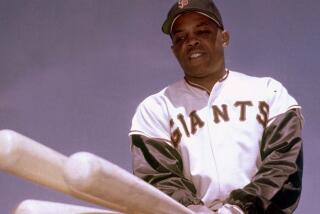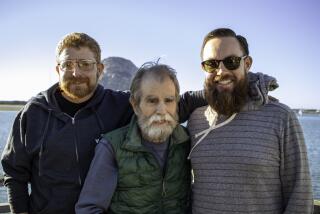Business Star to Icon of Greed
- Share via
The twilight years of Kenneth L. Lay’s career were supposed to be a model of elder statesmanship.
Having built Enron Corp. into an energy trading colossus, Lay seemed poised at the turn of the millennium to leave the corporate hustle behind for the realm of public service -- a run for mayor of Houston, perhaps, or a Cabinet post in the administration of his good friend George W. Bush.
Then there was the world of philanthropy, where a man with Lay’s record of involvement in causes such as the arts and minority education would be highly prized.
Instead, Lay’s final days in the public eye were spent in a federal courtroom in downtown Houston, where he and fellow former Enron Chief Executive Jeffrey K. Skilling were on trial for lying to the public about their company’s dire financial condition so that they could protect the value of their multimillion-dollar holdings of Enron stock.
When the trial concluded May 25 with a raft of guilty verdicts and the prospect of years in prison for both men, Lay could do little except pray with family members and gamely pronounce his innocence and intention to appeal.
Lay’s death early Wednesday of a massive heart attack at age 64 came less than six weeks after those verdicts. In an almost anticlimactic way, his death provided a coda to a life that saw the son of a small-town Missouri preacher rise to the heights of American business, only to end up as a symbol of corporate chicanery and greed.
“His career was like a Greek tragedy,” said Linnea Bernard McCord, associate professor of business law at the Graziadio School of Business and Management at Pepperdine University. “He started from nothing and became so successful. But as the Greeks taught long ago, hubris brings down the strongest.”
At the height of his success in the late ‘90s, Lay was routinely described as a visionary who shook up the tightly regulated natural gas business and invented a whole new way to trade energy. Enron became one of the country’s biggest and most admired companies, and Lay and other executives frequently landed on magazine covers -- stars of the brave new world of commodities trading.
But as details of the sordid side of Enron began to seep out in late 2001 and the company skidded toward what was then the biggest bankruptcy filing in U.S. history, Lay’s prestige plummeted along with the company’s stock price.
It was a stunning fall from grace for Lay, by all accounts a deeply religious man who, in the words of a former colleague, “believed in the rules set out by Christianity and thought Enron should lead the community in helping the unfortunate and disadvantaged.”
Kenneth Lee Lay was born April 15, 1942, in the small Ozark town of Tyrone, Mo. (current population: 40), the only son of a Baptist minister. The family was poor but proud, according to published interviews with Lay’s siblings, and took pains not to appear destitute.
With the help of scholarships and money earned from after-school jobs, Lay attended the University of Missouri in Columbia, receiving a bachelor’s degree in 1964 and a master’s degree a year later. He later would earn a doctorate in economics from the University of Houston.
After working for a predecessor of today’s Exxon Mobil Corp. in Houston and doing a hitch in the Vietnam War-era Navy, Lay landed at the Federal Power Commission during the Nixon administration. Along the way, he garnered a reputation for impressing his superiors -- whether it was an admiral or a power commissioner.
At the commission, Lay learned the intricacies of natural gas regulation, knowledge put to good use when he returned to the private sector in 1974.
After a long stint in the executive ranks of Florida Gas, Lay took the top job at Houston Natural Gas in 1984. The next year, he merged that firm with another gas company to form Enron, creating the largest natural gas pipeline system in the nation.
As the industry deregulated, Lay pushed Enron into a variety of businesses, including energy trading, power generation and water services.
“He had the early ideas and pushed to get it done,” said Michelle Michot Foss, chief energy economist and head of the Center for Energy Economics at the University of Texas in Austin.
By 2000, Enron ranked seventh on the Fortune 500 list of the nation’s biggest companies and claimed $101 billion in annual revenue.
As Enron grew rich and powerful, so did Lay. In 2000, he and his second wife, Linda, listed $52 million in assets and owned multiple vacation homes in Aspen, Colo., and on the Gulf Coast in Texas.
Lay also collected political allies, including George H.W. Bush and his son George W. Bush.
The younger Bush repeatedly flew on Enron corporate jets during the 2000 presidential campaign, and Lay and his company donated thousands of dollars to Bush and the GOP -- although associates note that Lay was savvy enough to include some Democrats in his campaign largess.
Bush and Lay exchanged frequent “Dear Ken” and “Dear George” letters, raising concern among Californians when the president refused to intervene in the 2000-01 energy crisis, which was proving quite profitable for his friend’s company.
In addition to dabbling in politics, Lay also became deeply involved in a variety of civic and philanthropic causes, becoming the go-to guy when money needed to be raised, a ballot measure needed to be passed or a foundation seat needed to be filled.
“If you were able to say to other companies, ‘Enron and Ken Lay are backing this issue,’ those were magic words,” recalled former Enron lobbyist George Strong, who worked with Lay to help pass two major school bond issues in Houston.
As he rose to power and influence, Lay cultivated a reputation as an avuncular man who always had time to listen and was always ready to help. Describing how Lay agreed to act as honorary chairman for an NAACP event, the Rev. William Nelson, formerly of the Wheeler Avenue Baptist Church in Houston, said, “Someone on his level wouldn’t do that unless he had real feelings for people of the underclass.”
Strong said that, physically at least, Lay “wasn’t very imposing.”
“But he could work a room,” Strong said. “Instead of looking over his shoulder to see who he had to talk to next, he was always maintaining eye contact. When people were talking to Ken Lay, they felt like they were talking to a minister.”
But Lay’s reputation for being affable was eroded during the trial when the former Enron CEO and chairman took the witness stand. Lay occasionally was sarcastic when answering prosecutors’ questions, was ambushed by evidence that he tried to contact witnesses in his case, and surprisingly was argumentative with his own attorney.
“The whole ‘Uncle Ken’ view didn’t always square with the necessities of a very competitive business world or with some of Ken’s aspirations,” one former Enron executive said.
As Lay’s civic duties grew, his day-to-day involvement at Enron waned. He appeared ready to slide into corporate semi-retirement and pursue a life of politics and philanthropy when Skilling, his handpicked successor to run Enron, shocked the business world by abruptly resigning as CEO in August 2001.
Lay retook the reins and during the next several weeks presided over the collapse of the company he created. Many of Enron’s overseas ventures turned out to be financial sinkholes, and subsequent investigation would show that the company was getting by on doctored financial statements while some of its executives enriched themselves through self-dealings.
Enron’s December 2001 bankruptcy filing wiped out more than 4,000 jobs and billions of dollars of stock market value and retirement savings. It also became the first in a string of corporate scandals -- among them WorldCom Inc., HealthSouth Corp. and Tyco International Ltd. -- and led to sweeping regulations and legislation meant to curb corporate wrongdoing and restore confidence in companies’ financial statements.
Throughout the scandal and their subsequent trial, Lay and Skilling claimed that they were betrayed by a handful of dishonest employees and that Enron was destroyed by a collapse in public confidence -- akin to a run on the bank -- rather than a pervasive fraud masterminded in the corporate suite.
But Lay’s credibility was showing cracks even before his conviction on fraud and conspiracy charges for trying to prop up Enron’s stock price by lying about the company’s financial condition.
He refused to testify before Congress about Enron’s demise in 2002, and it was soon discovered that Lay had quietly sold $70 million in Enron stock back to the company in 2001 while telling employees that the company was in fine shape and that the stock was a great buy.
To seasoned observers such as McCord of Pepperdine, memories of Lay’s stock sales and the era of scandal that bears his company’s name will provide the lasting legacy for the onetime corporate titan.
But in Houston, where Lay helped build sports stadiums, finance schools and promote the arts, at least some will remember another side.
As Houston Astros Craig Biggio and Morgan Ensberg whacked practice balls Wednesday evening at home plate inside the ballpark originally named Enron Field, team owner Drayton McLane Jr. met reporters there and spoke about Ken Lay.
“I saw the goodness that was in him. He genuinely cared about Houston,” McLane said. “I asked him, ‘Why are you working so hard on this?’ He said, ‘I want to make Houston a world-class city.’ ”
Lay is survived by his wife, five children and stepchildren and 12 grandchildren. Funeral arrangements were pending as of Wednesday, according to Lay’s church, First Methodist of Houston.
*
Times staff writer Miguel Bustillo in Houston contributed to this report.
More to Read
Inside the business of entertainment
The Wide Shot brings you news, analysis and insights on everything from streaming wars to production — and what it all means for the future.
You may occasionally receive promotional content from the Los Angeles Times.










